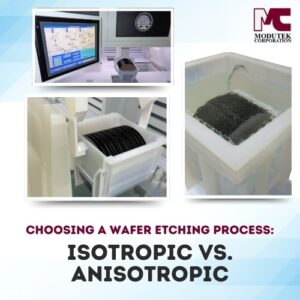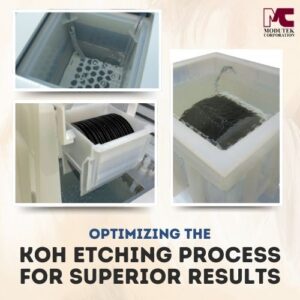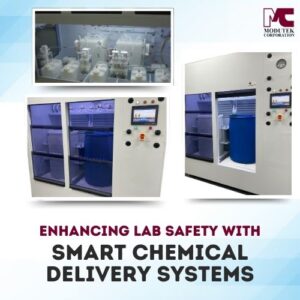![]() Semiconductor research labs and fabrication facilities employ high-precision silicon wet etching processes that are capable of delivering quality product in a consistent way. This is no mean feat: the microscopic structures etched on semiconductor wafers require processes that meet microscopic tolerances while reducing the minutest of impurities. Fabs are always on the lookout for improvements to make in these processes; the aim is to minimize the number of errors made during each of several processes. Results depend on constant efforts in the area of identifying the best etching processes, and utilizing the best equipment.
Semiconductor research labs and fabrication facilities employ high-precision silicon wet etching processes that are capable of delivering quality product in a consistent way. This is no mean feat: the microscopic structures etched on semiconductor wafers require processes that meet microscopic tolerances while reducing the minutest of impurities. Fabs are always on the lookout for improvements to make in these processes; the aim is to minimize the number of errors made during each of several processes. Results depend on constant efforts in the area of identifying the best etching processes, and utilizing the best equipment.
The Wafer Etching Process
The process of etching micro-circuitry on silicon wafers requires a complex multi-layered fabrication approach. It usually requires multiple cleaning, masking, and etching processes that involve the precise deposition of metal traces and components. At different stages along the way, these processes require the use of chemical baths of various kinds, each aimed at achieving different, specific results. At the end of one of these precisely designed processes, silicon wafers with traces, electrical connections and electronic components, all etched on a microscopic scale, emerge ready for market.
There are various requirements for an error-free process — precise control over the speed at which etching is done, and the ability to achieve extreme levels of cleanliness in the work areas in which etching is done, are two primary requirements. There are many others, as well.
Silicon nitride: Silicon nitride is applied to mask parts of wafers during the phosphoric acid etching process. Achieving greater precision in this process delivers superior results. In general, fabs do much better with the fabrication process when they possess over on-the-fly control over acid concentration and temperature.
Piranha etching: At semiconductor fabs, piranha etching is done using a mixture of piranha solution — a blend of hydrogen peroxide and sulfuric acid. Chemical baths need to be carefully controlled to supply the right chemical mix at the right time.
Potassium hydroxide: The etching process requires the use of potassium hydroxide solution in the creation of microscopic structures on semiconductor wafers. Achieving precise and error-free etches requires an ability to closely control the concentration of the solution, the temperature, the orientation of the silicon crystal and silicon purity. These variables can change during the etch process, and error-free results requires the ability to respond by speeding up or slowing down etch rate.
Buffered oxide etch: This is a process that employs hydrofluoric acid in addition to a buffering agent in order to etch fine masking films of silicon dioxide or silicon nitride. When correctly controlled, the process delivers a consistent and repeatable result that works with photoresist.
When it comes to improved silicon etching performance, the key to high-quality results is to utilize processing equipment from a vendor with proven experience and support. Modutek answers this requirement with 35 years in the field. Not only is Modutek able to supply the equipment, they are able to advise clients on the customizations needed to meet their requirements.
Choosing Equipment with the Right Features for Each Stage of the Wafer Etching Process
Modutek’s silicon wet etching equipment comes with some of the most advanced features on the market today:
Flow control and filtration control: Modutek’s precision acid filters are effective down to the 0.2 µm range and are able to work continuously to enable reuse of acid. This provides considerable savings in acid consumption.
Precision control of temperature: An ability to precisely control the temperature of an etching bath can result in lower error rates and reliable output. In any process, Modutek’s equipment comes with the ability to control temperatures to within 1 degree of required settings.
Precision tech design: Potassium hydroxide requires the use of Teflon tanks; piranha solution requires quartz. Modutek designs these tanks in a wide variety of configurations and sizes.
Modutek is dedicated to helping clients find ways to improve the efficiency of their silicon wet etching processes, improve productivity and output quality. To this end, Modutek’s offers extensive consultation and equipment customization needed to meet each customer’s requirements.




